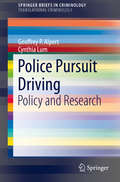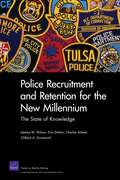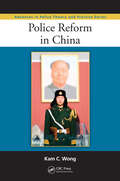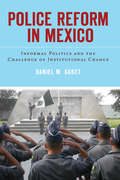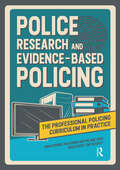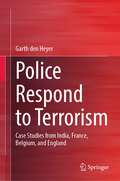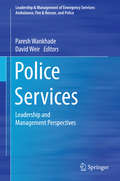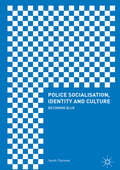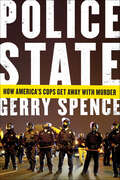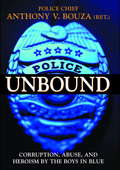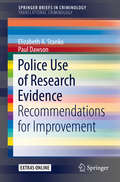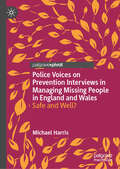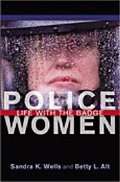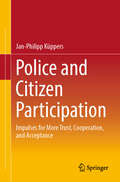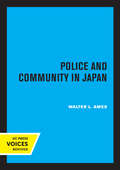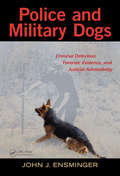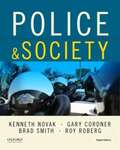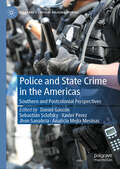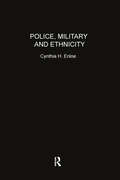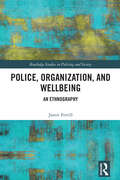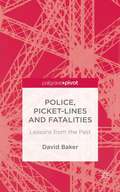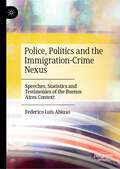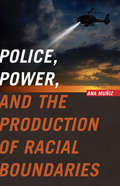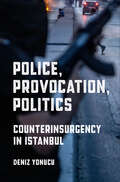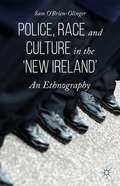- Table View
- List View
Police Pursuit Driving
by Cynthia Lum Geoffrey P. AlpertPolice pursuits, often receiving a lot of media attention, have become a topic of concern and priority for both law enforcement and the communities they serve They often come with high risks for the well-being of community members and for both the police officers involved in the chase as well as for the fleeing suspects In this brief, we summarize what is known about police pursuits, from both legal decisions and criminological research. We then discuss the impact of this research on police pursuit policy, court decisions, and media reports. We offer suggestions about the need for more development and use of research, and the challenges for research to be integrated into police policies, training, supervision and accountability systems.
Police Recruitment and Retention for the New Millennium
by Clifford A. Grammich Charles Scheer Erin Dalton Jeremy M. WilsonMany police departments report difficulties in creating a workforce that represents community demographics, is committed to providing its employees the opportunity for long-term police careers, and effectively implements community policing. This book summarizes lessons on recruiting and retaining effective workforces.
Police Reform in China (Advances in Police Theory and Practice)
by Kam C. WongSweeping changes have altered the cultural landscape of China. This volume provides an insightful glimpse of policing in the midst of such change. Beginning with a historical account of police reform in the region since 2000, it discusses the difficulties encountered in trying to understand Chinese policing. Demonstrating how old ideologies are increasingly in conflict with the values and lifestyles of a new mentality, the book discusses steps that can be taken to improve professionalism. The final chapters highlight the importance of understanding the Chinese people, culture, values, and interests in order to truly effectuate successful police reform.
Police Reform in Mexico: Informal Politics and the Challenge of Institutional Change
by Sabet Daniel M.The urgent need to professionalize Mexican police has been recognized since the early 1990s, but despite even the most well-intentioned promises from elected officials and police chiefs, few gains have been made in improving police integrity. Why have reform efforts in Mexico been largely unsuccessful? This book seeks to answer the question by focusing on Mexico's municipal police, which make up the largest percentage of the country's police forces. Indeed, organized crime presents a major obstacle to institutional change, with criminal groups killing hundreds of local police in recent years. Nonetheless, Daniel Sabet argues that the problems of Mexican policing are really problems of governance. He finds that reform has suffered from a number of policy design and implementation challenges. More importantly, the informal rules of Mexican politics have prevented the continuity of reform efforts across administrations, allowed patronage appointments to persist, and undermined anti-corruption efforts. Although many advances have been made in Mexican policing, weak horizontal and vertical accountability mechanisms have failed to create sufficient incentives for institutional change. Citizens may represent the best hope for counterbalancing the toxic effects of organized crime and poor governance, but the ambivalent relationship between citizens and their police must be overcome to break the vicious cycle of corruption and ineffectiveness.
Police Research and Evidence-based Policing (The Professional Policing Curriculum in Practice)
by Craig Hughes Emma Spooner Phil Mike JonesEvidence-based policing is a core part of the National Policing Curriculum but policing students and new officers often feel daunted by the prospect of understanding research and how to use it to inform decision making in practice. This text helps readers develop a sound understanding of evidence-based practice in policing and contextualises the research process by explaining how it supports practice within the workplace. It clearly relates research to the investigative process, combining academic theory and operational understanding using relevant case studies and scenarios, and identifies the main approaches employed. It explores how evidence from research can be used to inform and develop critical arguments central to policing practice and signposts students to key sources of information.The Professional Policing Curriculum in Practice is a new series of books that match the requirements of the new pre-join policing qualifications. The texts reflect modern policing, are up-to-date and relevant, and grounded in practice. They reflect the challenges faced by new students, linking theory to real-life operational practice, while addressing critical thinking and other academic skills needed for degree-level study.
Police Respond to Terrorism: Case Studies from India, France, Belgium, and England
by Garth den HeyerThis book examines the police response to the terrorist attacks in case studies that occurred in Mumbai (2008), Paris (2015), Brussels (2016) and Manchester (2017). The methodological approach to the case studies is comparative and features an interactive framework that incorporates a number of key variables. These variables include an examination of each of the terrorist attacks, a description of the terrorists involved, their actions, the response of the police and any weaknesses and strengths identified in the police response.Following the introduction, the book comprises of three sections. The first section looks at the theory of the police response to terrorism. The second section includes the presentation of the four case study terrorist attacks. The third and final section includes an analysis and comparison of the case study attacks and an examination on how the police response to terrorist attacks could be improved. It is ideal for policing professionals.
Police Services
by Paresh Wankhade David WeirThis volume provides fresh insights and management understanding of the changing role of policing against the backdrop of massive cuts in public expenditure experienced and the changing landscape of policing. The challenges of funding, training, online-crimes and cultural transformation are now felt globally. The need to learn and adapt from suitable models of police service delivery have never been greater. The book offers critical insights into the theory and practice of strategic and operational management of police services and the related professional and policy aspects. One of the highlight of this volume is to bring together scholarship using experts- academics, practitioners and professionals in the field, to each of the chosen topics. The chapters are based in the practical experiences of the authors and are written in a way that is accessible and suitable for a range of audiences. We are confident that this book will cater to a wider audience to inform policy and practice, both in the UK and internationally. Sir Peter Fahy QPM, Chief Constable, Greater Manchester Police Policing across the world is facing an increasing complexity of demand and public expectation creating new challenges for leadership and management. The contributors to this work are among the leading thinkers in policing and present important new insights into both the past and the way forward. It will be welcomed by all those convinced that radical new approaches are required across the public services. Bill Skelly, Deputy Chief Constable, Devon and Cornwall Police, UK At times it feels that the focus on leadership in the police service is all about what went wrong; the negative influences of a tightly-knit culture; and the almost inevitable rise of the technocrat. It is refreshing to read a book that seeks new insights into the positive influences of police leadership and offers the prospect of a more emotionally aware and spiritually rich approach as to how those insights may be practically employed for the benefit of all in the police family and the communities we serve.
Police Socialisation, Identity and Culture
by Sarah CharmanThis book reinvigorates the debate about the origins and development of police culture within our changing social, economic and political landscape. An in-depth analysis and appreciation of the police socialisation, identity and culture literature is combined with a comprehensive four-year longitudinal study of new recruits to a police force in England. The result offers new insights into the development of, and influences upon, new police recruits who refer to themselves as a "new breed" of police officer. Adding significantly to the police culture literature, this original and empirically based research also provides valuable insights into the challenges of modern policing in an age of austerity. Scholars of policing and criminal justice, as well as police officers themselves will find this compelling reading.
Police State: How America's Cops Get Away with Murder
by Gerry SpenceHow does America, founded on the promise of freedom for all, find itself poised to become a police state?In Police State, legendary "country lawyer" Gerry Spence reveals the unnerving truth of our criminal justice system. In his more than sixty years in the courtroom, Spence has never represented a person charged with a crime in which the police hadn't themselves violated the law. Whether by hiding, tampering with, or manufacturing evidence; by gratuitous violence and even murder, those who are charged with upholding the law too often break it. Spence points to the explosion of brutality leading up to the murder of Freddie Gray in Baltimore, insisting that this is the way it has always been: cops get away with murder. Nothing changes. Police State narrates the shocking account of the Madrid train bombings -how the FBI accused an innocent man of treasonous acts they knew he hadn't committed. It details the rampant racism within Chicago's police department, which landed teenager Dennis Williams on death row. It unveils the deliberately coercive efforts of two cops to extract a false murder confession from frightened and mentally fragile Albert Hancock, along with other appalling evidence from eight of Spence's most famous cases.We all want to feel safe. But how can we be safe when the very police we pay to protect us instead kill us, maim us, and falsify evidence against us. Can we accept the argument that cops may occasionally overstep their boundaries, but only when handling guilty criminals and never with us? Can we expect them to investigate and prosecute themselves when faced with allegations of misconduct? Can we believe that they are acting for our own good? Too many innocent are convicted; too many are wrongly executed. The cost has become too high for a free people to bear.In Police State, Spence issues a stinging indictment of the American justice system. Demonstrating that the way we select and train our police guarantees fatal abuses of justice, he also prescribes a challenging cure that stands to restore America's promise of liberty and justice for all.
Police Unbound
by Anthony V. BouzaFormer chief of police in Minneapolis and commander of the Bronx police force Tony Bouza pulls no punches in this blunt, candid assessment of police culture. Emphasizing the gap between the average citizen's perception of police work and the day-to-day reality of life as a cop, Bouza reveals the inner dynamics of a secretive, fraternal society that will do almost anything to protect itself. The strong bonds of loyalty among police both inspire individual acts of heroism in the face of danger but also repress full disclosure of the truth when corruption or abuse of power are suspected, says Bouza. Young rookies are quickly molded by the unspoken rules and the code of silence that govern a cop's professional life, and they soon learn that physical but not moral courage is expected.Bouza evaluates sweeps, roundups, sting operations, the controversial practice of racial profiling, and the politics of law enforcement. He critically examines the excesses, abuses, and corruption of the New York, Los Angeles, and Minneapolis police forces, among others, offering insights into what went wrong in the infamous Louima and Diallo cases.But his most telling criticism is not directed against the police per se but against our society's ruling elites and the middle class, who give police the unmistakable message that the underclass must be kept down and property owners protected at all costs. He charges that the heart of the problem of both crime and police abuse in America is our tacitly accepted class structure separating the privileged from the poor, and along with it the systemic racism that society as a whole is not yet willing to face. Bouza concludes his critique on a positive note with straightforward proposals on how to make the police more ethical and effective.This controversial, eye-opening book by a veteran insider exposes a reality that TV cop shows never portray and raises serious moral questions about class and race.From the Hardcover edition.
Police Use of Research Evidence
by Elizabeth A. Stanko Paul DawsonThis brief takes the reader through a 10-year journey of seeking to embed Evidence Based Policing within one of the largest police forces in the world - the Metropolitan Police Service in London, England - from the inside. As a topic, Evidence Based Policing has generated considerable recent interest and academic discussion - although largely remains without a consistent guiding voice for police practitioners. The aim of the brief is to expand upon the current discussions and address this gap within the day-to-day reality of policing where translation of research is a routine part of the day job. The book is organised into three sections: the first explores receptivity to evidence, asking practitioners to locate where they are on a continuum of evidence based craftwork; the second presents the importance of programme integrity and effective implementation in police craft; and the final section explores the challenges in professionalising policing and offers a more nuanced discussion around what it really means to be evidenced based. Throughout the brief the authors promote an insider whole-force strategic approach in landing evidence into policing 'business as normal' as opposed to an external academic or educated individual officer translation approach. Over the course of the monograph the authors draw upon their decade of experience providing case studies, toolkits, exercises, anecdotes and research experience as an inspiration for police practitioners both to practically support and inspire better evidence based working as part of the day job.
Police Voices on Prevention Interviews in Managing Missing People in England and Wales: Safe and Well?
by Michael HarrisThis book rigorously examines police voices when people are reported missing, through empirical research. It explores the international literature in this emerging research field of missing people and presents new research of nearly 2,000 Constables from England and Wales, using quantitative and open qualitative questions. It explores the attitudes of police officers to Prevention Interviews (PI) of adults and children and examines whether the PI should be the responsibility of the police. It makes recommendations about best practice for the missing person process, advocating a more consistent, multi-agency approach to improve interventions.
Police Women: Life With The Badge
by Sandra K. Wells Betty L. AltIt is often said that a woman must do a job twice as well as a man in order to get half the credit. This is particularly true of women in law enforcement. <p><p>Women have been involved in various forms of policing for the last 100 years, but it wasn't until the Equal Employment Act of 1970 that women could move from the job of meter maids to patrol and detective work. Yet less than 1% of all top-level cops are women, and there remain significant obstacles in the career paths of women in the force. This book looks at the history of women police officers and provides first-hand accounts of women at every level, including those who drop out. It addresses discrimination, competition, lack of mentoring, differential treatment and sexual harrassment, examining what issues play into the decision to stick it out or leave that many policewomen face. It also considers the family issues these women return home to at the end of the day. <p><p> It is often said that a woman must do a job twice as well as a man in order to get half the credit. This is particularly true of women in law enforcement. Women have been involved in various forms of policing for the last 100 years, but it wasn't until the Equal Employment Act of 1970 that women could move from the job of meter maids to patrol and detective work. Yet less than 1% of all top-level cops are women, and there remain significant obstacles in the career paths of women in the force. This book looks at the history of women police officers and provides first-hand accounts of women at every level, including those who drop out. It addresses discrimination, competition, lack of mentoring, differential treatment, and sexual harrassment. It looks at what plays into the decision to stick it out or leave that many policewomen face. It also considers the family issues these women return home to at the end of the day. <p><p> Unlike other treatments of the subject, Alt and Wells show how women have changed police work into a more community-oriented model of policing, reduced police violence, served as a strong force to promote a more effective response to domestic violence within police departments, and helped with community-police relations. With a combination of first-hand accounts, careful research, and lively analysis, the authors are able to convey the actual experiences of women who have made their careers behind the shield.
Police and Citizen Participation: Impulses for More Trust, Cooperation, and Acceptance
by Jan-Philipp KüppersThis book explains why participation processes have gained importance for the police and how they can be successfully designed. In the future, an integrated security structure will increasingly be required, in which stakeholder groups and affected citizens play an important role in police hazard and risk assessment, and thus in shaping their context-related sense of security. The book pursues a guiding and action-oriented approach on how practical participation processes for citizens can be integrated into the planning and projects of the police. Theoretical foundations and practical application fields for the implementation of participation processes are identified: involvement in cooperation discussions for discursive conflict resolution in advance of protest situations, opinion formation through information and discursive exchange of arguments within the framework of municipal security and prevention work, or issue-related "round tables" in the area of independent citizen and police commissioners. In a time of great uncertainty due to social change and complexity, participation processes offer the opportunity to ease strained relationships between the police and civil society and to build a mutual trust relationship. Citizen participation cannot replace sovereign action but can enrich it with everyday and experiential knowledge. In these turbulent times, there is no better recipe for jointly shaping security and addressing problems. The Content Practical assistance and better understanding of participation processes for police work Advantages of citizen participation at a glance Three practical application areas (cooperation discussions in protest situations, independent citizen and police commissioners, and municipal security and prevention work)
Police and Community in Japan
by Walter Lansing AmesThis title is part of UC Press's Voices Revived program, which commemorates University of California Press’s mission to seek out and cultivate the brightest minds and give them voice, reach, and impact. Drawing on a backlist dating to 1893, Voices Revived makes high-quality, peer-reviewed scholarship accessible once again using print-on-demand technology. This title was originally published in 1981.
Police and Military Dogs: Criminal Detection, Forensic Evidence, and Judicial Admissibility
by John EnsmingerIt is essential that those in the criminal justice system understand the tasks that police dogs perform and the evidence that their work produces. Police and Military Dogs: Criminal Detection, Forensic Evidence, and Judicial Admissibility examines the use of police and military dogs for a wide variety of functions and explores canine biology and be
Police and Society
by Gary Cordner Roy Roberg Kenneth Novak Bradley SmithPolice & Society, Eighth Edition, offers an in-depth and analytical look at policing, from police behavior and organization to operations and historical perspectives. Focusing on the relationship between the police and the community and how it has changed throughout the years, the authors explore the most important theoretical foundations and incisive research on contemporary policing and show how that research is put into practice. The text is enhanced by extensive pedagogy and a unique chapter on higher education and policing.
Police and State Crime in the Americas: Southern and Postcolonial Perspectives (Palgrave's Critical Policing Studies)
by Daniel Gascón Sebastián Sclofsky Xavier Perez Jhon Sanabria Analicia Mejia MesinasThis book advances a much-needed “postcolonial” framework in analyzing the police. It seeks to deepen our understanding of the police role in maintaining Western global domination throughout the American region despite the violent end of colonial rule. Building on Chevigny's (1995) classic study, this book seeks to draw renewed attention to the role of police in perpetrating state violence and serving as the tip of the spear of state power. It seeks to understand the construction of marginality and the multiple and intersecting structures of colonial domination, before shining a light directly on the crimes of the state, in an attempt to hold criminal state organizations to account. It draws on interdisciplinary perspectives and methodologies that center marginalized and colonized experiences and allows for the development of countercolonial knowledge. It speaks to academics and students in criminology, sociology, political science, and law, as well as toethnic and area studies programs, such as Chicano/Latino and Latin American Studies, and to police administrators and policymakers.
Police, Military and Ethnicity: Foundations of State Power
by Cynthia H. EnloeThis collection of essays describes and analyzes the ways in which government policymakers go about designing police forces and militaries. The author includes both wide-ranging comparative investigations of the dimensions of the state security phenomenon and specific case studies.Dr. Enloe uses the sociological concept of ethnicity to demon-strate how the armed forces in sev-eral nations have capitalized on racial and ethnic diversity to foster their own goals and those of the government and power elites. She examines this idea by focusing on the ethnic factors involved in the evolution of the South African military, the military-ethnic con-nection in Malaysia, and the role of the armed forces in the conflict in Ulster.The author illustrates convin-cingly that not only individual citizens desire security, but that nation-states themselves are en-gaged in the same pursuit. What often passes for or is justified in the name of citizen protection is in fact done to strengthen the state itself. Militaries are recruited in ethni-cally skewed ways, and increasing numbers of police forces through-out the world have military capacities not to enhance the secu-rity of private individuals, but to protect the status quo of the central government and the nation's "es-tablishment."Dr. Enloe covers an assortment of countries within the framework of her central argument, which is practically as well as theoretically significant. Each chapter can be read on its own, and all deal with currently salient political condi-tions.
Police, Organization, and Wellbeing: An Ethnography (Routledge Studies in Policing and Society)
by Jamie FerrillBased on the study of a police organization in England, this book explores the role of social relations in the ways that people construct, mobilize, consume, and reconstruct meaning about wellbeing. Wellbeing is a powerful, institutionalized concept in police organizations across England and Wales. With the emergence of numerous policies, strategies, and practices that both explicitly and implicitly address wellbeing in the workplace, the concept has come to feature prominently. Wellbeing is addressed as an issue that needs to be understood intersubjectively by attending to the underlying social issues that shape how it is promoted or denied. After a theoretical exploration of police culture and wellbeing, the book traverses ethnographic data and captures insights from individuals across the organization’s hierarchy. It explores what individuals perceive wellbeing to mean and how they make sense of the concept. The book reveals discernible ideological-laden tensions across the hierarchy in terms of wellbeing constructions. By exploring these tensions, there is a potential to understand the constructions of wellbeing and the resultant implications for practice. This book will be of interest to academics, researchers, and students in policing, criminology, criminal justice, leadership/management, organizational behaviour, and wellbeing. Given its empirical focus and applicability to practitioners, it will also be of interest to a range of non-academics, including police officers and leaders, public servants, private organizations, policymakers, and human resources professionals.
Police, Picket-Lines and Fatalities: Lessons from the Past
by David BakerBaker explores public protests and their management by the police, focusing on the fatalities of strikers at the hands of police and outlining practices towards preventing such tragedies.
Police, Politics and the Immigration-Crime Nexus: Speeches, Statistics and Testimonies of the Buenos Aires Context
by Federico Luis AbiusoThis book examines the relationship between immigration, crime, police and politics in the city of Buenos Aires during the Cambiemos ("Let's Change") administration, which took place in Argentina between 2015 and 2019. It draws on semi-structured interviews with migrants to offer insights into interactions between police and migrants, narratives of police violence, police attitudes towards migrants, the nexus between police and politics and the perception of the vulnerability of the migratory community of belonging to police action. Using a mixed methods approach, it also draws on secondary quantitative data regarding police practices of detention of migrants and examines political discourses around the immigration-crime association. In essence, it discusses the changes in attitude of the police towards different ethnic-national groups during the administration Cambiemos. In this sense, it presents empirical research and methodological insights from the Global South.
Police, Power, and the Production of Racial Boundaries
by Ana MuñizBased on five years of ethnography, archival research, census data analysis, and interviews, Police, Power, and the Production of Racial Boundaries reveals how the LAPD, city prosecutors, and business owners struggled to control who should be considered "dangerous" and how they should be policed in Los Angeles. Sociologist Ana Muñiz shows how these influential groups used policies and everyday procedures to criminalize behaviors commonly associated with blacks and Latinos and to promote an exceedingly aggressive form of policing. Muñiz illuminates the degree to which the definitions of "gangs" and "deviants" are politically constructed labels born of public policy and court decisions, offering an innovative look at the process of criminalization and underscoring the ways in which a politically powerful coalition can define deviant behavior. As she does so, Muñiz also highlights the various grassroots challenges to such policies and the efforts to call attention to their racist effects. Muñiz describes the fight over two very different methods of policing: community policing (in which the police and the community work together) and the "broken windows" or "zero tolerance" approach (which aggressively polices minor infractions--such as loitering--to deter more serious crime). Police, Power, and the Production of Racial Boundaries also explores the history of the area to explain how Cadillac-Corning became viewed by outsiders as a "violent neighborhood" and how the city's first gang injunction--a restraining order aimed at alleged gang members--solidified this negative image. As a result, Muñiz shows, Cadillac-Corning and other sections became a test site for repressive practices that eventually spread to the rest of the city.
Police, Provocation, Politics: Counterinsurgency in Istanbul (Police/Worlds: Studies in Security, Crime, and Governance)
by Deniz YonucuIn Police, Provocation, Politics, Deniz Yonucu presents a counterintuitive analysis of contemporary policing practices, focusing particular attention on the incitement of counterviolence, perpetual conflict, and ethnosectarian discord by the state security apparatus. Situating Turkish policing within a global context and combining archival work and oral history narratives with ethnographic research, Yonucu demonstrates how counterinsurgency strategies from the Cold War and decolonial eras continue to inform contemporary urban policing in Istanbul. Shedding light on counterinsurgency's affect-and-emotion-generating divisive techniques and urban dimensions, Yonucu shows how counterinsurgent policing strategies work to intervene in the organization of political dissent in a way that both counters existing alignments among dissident populations and prevents emergent ones. Yonucu suggests that in the places where racialized and dissident populations live, provocations of counterviolence and conflict by state security agents as well as their containment of both cannot be considered disruptions of social order. Instead, they can only be conceptualized as forms of governance and policing designed to manage actual or potential rebellious populations.
Police, Race and Culture in the 'New Ireland': An Ethnography
by Sam O'Brien-OlingerPolice, Race and Culture in the 'New Ireland'.
